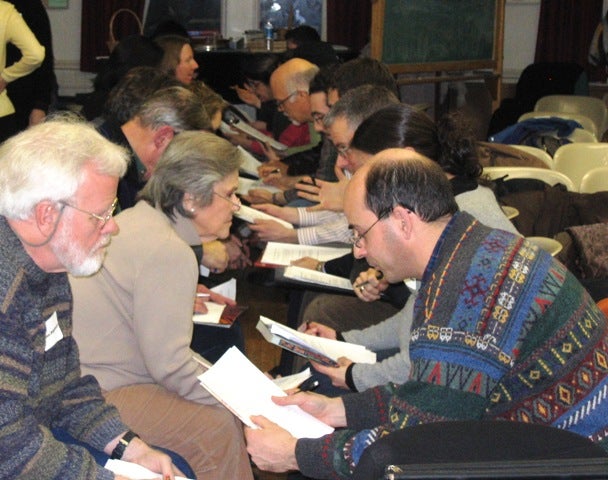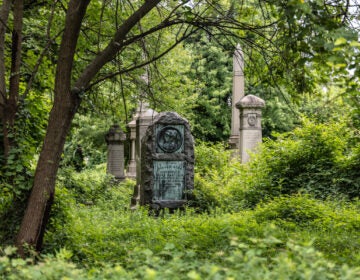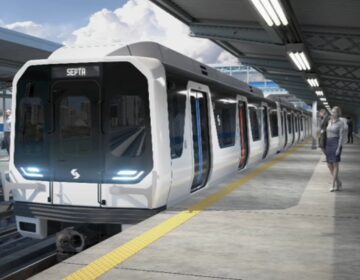First principle session: Society Hill

Feb. 12
Riverfront values begin to create design principles. History by Matt Blanchard; Safety by Linda K. Harris; Diversity by Kellie Patrick. Video
Monday night, the final phase of public forums designed to infuse civic engagement into the Central Delaware Waterfront planning process got underway as 100 residents gathered at St. Peter’s School in Society Hill to start to develop a set of “design principles” based on the core riverfront values that citizens from Philadelphia and the region surfaced during the three December forums.
Listed below are the citizen values consolidated from the “values sessions” on Dec. 11, 13 and 14:
A safe place to live:
We value a neighborhood where children can play outside, where adults and kids alike walk the neighborhood, where they can feel safe because they know and trust each other, whether they live or work in the community.
Varieties of diversity and culture:
We appreciate the economic, ethnic, racial, cultural, generational and physical (ecological and architectural) diversity in our neighborhoods.
Economic sustainability:
The quality jobs on the waterfront are an economic engine of the city. It is important that we sustain, if not expand, industrial and shipping jobs as well as small locally owned businesses. This will underpin a strong economy for adults as well as jobs for youth.
The Environment:
We value a clean and open environment – including the river, trees, air – and access to that environment.
History:
We value Philadelphia’s history – where our democracy was born, where different ethnic groups came and prospered. The traditions that grow from that history – from the Mummers Parade to our block parties and our celebrations of freedom – make us uniquely Philadelphia. Our history is a vital aspect of our city — be it bricks and mortar, cultural/educational or other.
With these values in mind, participants interviewed each other Monday night, asking a question about what each value represented in terms of broadly framing a set of design parameters for the waterfront.
The “reporter’s” task was to try to understand the other person’s views as richly and clearly as possible and to record them briefly and accurately. Later the group as a whole synthesized ideas with others who asked the same question.
When answering the questions, participants were urged to draw on their hopes and dreams for the waterfront.
The facilitators for this process: PennPraxis director Harris Steinberg of Penn’s School of Design; Harris Sokoloff, an expert in civic engagement with the Penn Graduate School of Education; and Philadelphia Planning Commission representative Alan Urek, see the public meetings as a way to capture and use the voice of the people to help lay the foundation for creating a lasting vision for that waterfront.
Steinberg started the evening’s discussion by putting the possibility of casinos into an overall planning perspective.
”The elephant in the room is casinos. My sense of whether or not we have casinos is irrelevant. This process is a planning process for creating a civic vision for seven miles of riverfront.
“There is a lot more development happening or potentially happening on the Delaware besides casinos. This process is not about taking a stand on casinos. It’s about reflecting the best way to re-vision the Delaware Riverfront as a whole.”
The value questions posed Monday night in order to establish design principles were:
A safe place to live: Please tell a story that describes your experience with the waterfront and the neighborhoods being a safe place to live, work and play. What does your story suggest about what could or should be done to preserve or improve this value?
Varieties of diversity and culture: Please tell a story that describes your experience with variety of diversity and culture on the waterfront and the neighborhoods. What does your story suggest about what could or should be done to preserve or improve this value?
Economic sustainability: Please tell a story that speaks to you about the importance of the waterfront economy. What does your story suggest about what could or should be done to preserve or improve this value?
The Environment: Please tell me a story about a time when you were able to appreciate the value of a clean and open environment along the waterfront. What does your story suggest about what could or should be done to preserve or improve this value?
History: Please tell a story about a time when you had a meaningful experience of Philadelphia’s history along the waterfront. What things could have been improved to make your experience of that history more meaningful does your story suggest about what could or should be done to preserve or improve this value?
The principles that were identified Monday night are, in effect, guidelines for the development of the civic vision for the waterfront. They inform and tell the planning and design teams the kinds of things to include in the plan and they will be used in the March 1-3 design charrettes.
Some of the principles that were identified were: a river trail like the one on the Schuylkill; development and parks that overlook the water; space for unprogrammed river recreation; a living history adjunct to the Seaport Museum; transit opportunities that allow for easy riverfront access; a beach at river’s edge; safety in numbers of people using the waterfront; increased access because of proper lighting; fishing piers that bring people to the water.
Many more principles will be developed in the coming week. PlanPhilly will post three stories that came out of specific group discussions Tuesday on the site.
A second session that was scheduled for Tuesday night at the Cescaphe Ballroom has been canceled due to inclement weather. Praxis welcomes anyone who was signed up for that sesion to attend the Feb. 20th principle session at Furness High School, S. 3rd St. and Mifflin St., Philadelphia, from 6-9 p.m.
WHYY is your source for fact-based, in-depth journalism and information. As a nonprofit organization, we rely on financial support from readers like you. Please give today.






